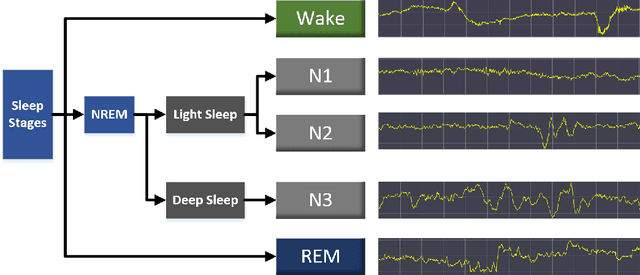Zhimin Hu
School of Information, North China University of Technology
Sleep Staging Based on Multi Scale Dual Attention Network
Aug 14, 2021



Abstract:Sleep staging plays an important role on the diagnosis of sleep disorders. In general, experts classify sleep stages manually based on polysomnography (PSG), which is quite time-consuming. Meanwhile, the acquisition process of multiple signals is much complex, which can affect the subject's sleep. Therefore, the use of single-channel electroencephalogram (EEG) for automatic sleep staging has become a popular research topic. In the literature, a large number of sleep staging methods based on single-channel EEG have been proposed with promising results and achieve the preliminary automation of sleep staging. However, the performance for most of these methods in the N1 stage do not satisfy the needs of the diagnosis. In this paper, we propose a deep learning model multi scale dual attention network(MSDAN) based on raw EEG, which utilizes multi-scale convolution to extract features in different waveforms contained in the EEG signal, connects channel attention and spatial attention mechanisms in series to filter and highlight key information, and uses soft thresholding to remove redundant information. Experiments were conducted using two datasets with 5-fold cross-validation and hold-out validation method. The final average accuracy, overall accuracy, macro F1 score and Cohen's Kappa coefficient of the model reach 96.70%, 91.74%, 0.8231 and 0.8723 on the Sleep-EDF dataset, 96.14%, 90.35%, 0.7945 and 0.8284 on the Sleep-EDFx dataset. Significantly, our model performed superiorly in the N1 stage, with F1 scores of 54.41% and 52.79% on the two datasets respectively. The results show the superiority of our network over the existing methods, reaching a new state-of-the-art. In particular, the proposed method achieves excellent results in the N1 sleep stage compared to other methods.
 Add to Chrome
Add to Chrome Add to Firefox
Add to Firefox Add to Edge
Add to Edge